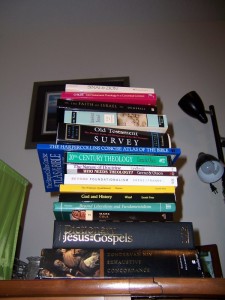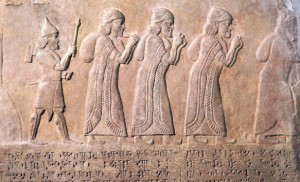We can’t take it all: Books
We are two and half months away from our summer trip to Swaziland and just a little over a year away from when we actually plan on moving. That has Beth and I looking at things in new ways. We are asking questions like “What are we going to do with our dishes?” and “Who is going to keep Shiloh?” We have spent close to two years trying to accumulate less and downsize where we can. In my mind I have already begun making a list of what things we will want to take with us and what needs to be given away, sold, loaned out or put in storage.
I knew early on the hardest thing for me to part with would be my collection of books. Not because they are so valuable (although I do have several thousand dollars wrapped up in them), but because in many ways they define me. To help the transition, I moved most of my academic collection out of my house and to the church. That way other people could use them and if I left them there I wouldn’t feel like they were lost.
Now, as we are beginning to investigate actually job opportunities, and we realize there is a decent chance I will be able to teach at either a school or the University, I have begun thinking about what resources I would need. That, along with our overall planning for the future, has prompted me to start a list of books I already own that I want to take with me. Since my training is mostly in Biblical Studies (especially the Hebrew Scriptures) a majority of the books are from this field . I have also included books from fields like Christian History and Theology to have as a reference, but I must admit I do not feel qualified to teach anything but basic topics in these areas. Finally, there are a few books that have been so influencial for me that they had to be included. You will note I have not included any fiction or pleasure reading — I figure I can pick that up while I am there.
Here is my list of “Keepers” (shoot me a comment if you think of any good ones I am leaving out):
- The New Interpreter’s Study Bible, NRSV -This was my seminary bible and still my favorite for reading through (I figure I can leave my leather-bound Thompson Chain here in the states.
- BHS and NA27 – You have to start with the original texts.
- Basics of Biblical Hebrew Grammar, Pratico and VanPelt – This is not the Hebrew grammar I learned on, but I have found it is the best for catching me back up when I find I have let my language skills slack.
- A Guide to Biblical Hebrew Syntax, Arnold and Choi – A concise reference that is phenomenal for making a budding scholar look like they know more than they really do.
- Basics of Biblical Greek Grammar, Mounce – The Greek counterpart to Pratico and VanPelt. My Greek is much rougher than my Hebrew, but this is a good grammar to get back up to speed.
- Life in Biblical Israel, King and Stanger – An excellent reference and even better bathroom reading. This book is the gooey center of the cinnamon roll – it really helps the text come alive through detailed contextual insights.
- A Biblical History of Israel, Provan, Long and Longman – More of a reference than anything else. Well documented and easy to use as a gateway for deeper studies.
- Harper Collins Concise Atlas of the Bible – Another great reference. Not especially thorough, but very helpful.
- Epic of Eden, Richter – If I ever have the opportunity to teach an introduction to Old Testament, I would want to teach it like Dr. Richter.
- An Introduction to the Old Testament, Brueggemann – While I don’t agree with him on all fronts, my theology and understanding of the Old Testament is most shaped by Walter Brueggemann and this is a great primer/survey.
- Introducing the New Testament, Achtemeier, Green and Thompson – Not my favorite New Testament Survey, but the only one I own.
- Christian Origins and the Question of God Trilogy, NT Wright – These have long been my go to reference for all things related to New Testament concepts.
- The New Testament and the People of God – This is the best book I have found for laying out the setting of the New Testament and its implications
- Jesus and The Victory of God – My Christology is largely shaped by Wright’s thoughts in this book.
- The Resurrection of the Son of God – I don’t have this one yet, and in practice, I use it the least so if space is tight, I may only take the first two.
- Eerdmans Dictionary of the Bible – By no means my favorite source for Biblical information, but handy to have around when you need to look up things you have forgotten (like which ecumenical council discussed the Arian controversy?)
- History of the World Christian Movement, Irvin and Sunquist – In my undergrad and seminary career I have read quite a few Church History books and this one is by far the best. I am anxiously awaiting Volume II.
- The Story of Christian Theology, Olson – I am very weak in my knowledge of the history of theology and this is the only book I have to reference.
- Challenge of Jesus, N.T. Wright – While Wright does discuss Christology in this book and it does have academic merit, for me, it is a defining book in how I understand the nature of Christianity.
- Prophetic Imagination, Walter Brueggemann – I know I sound like a broken record when I mention this book, but one of the most important concepts in my life that I live by is Brueggemann’s idea of the prophetic imagination and criticizing/energizing culture and community.
- The Politics of Jesus, John Howard Yoder – I may never have the opporutnity to teach from Yoder’s book, but I will certainly be able to live by it.
- Walden, Henry David Thoreau – One of my sources of rejuvenation.
- Where do we go from here: Chaos or Community, Martin Luther King Jr – We named our daughter after King; surely I must take his most seminal work.
So I was able to whittle my collection of several hundred down to 22. Even then there are so many that I am leaving out that I would love to include. In reality, this list is probably too large when you consider how much we can actually take with us; but…. at least it is a start.

